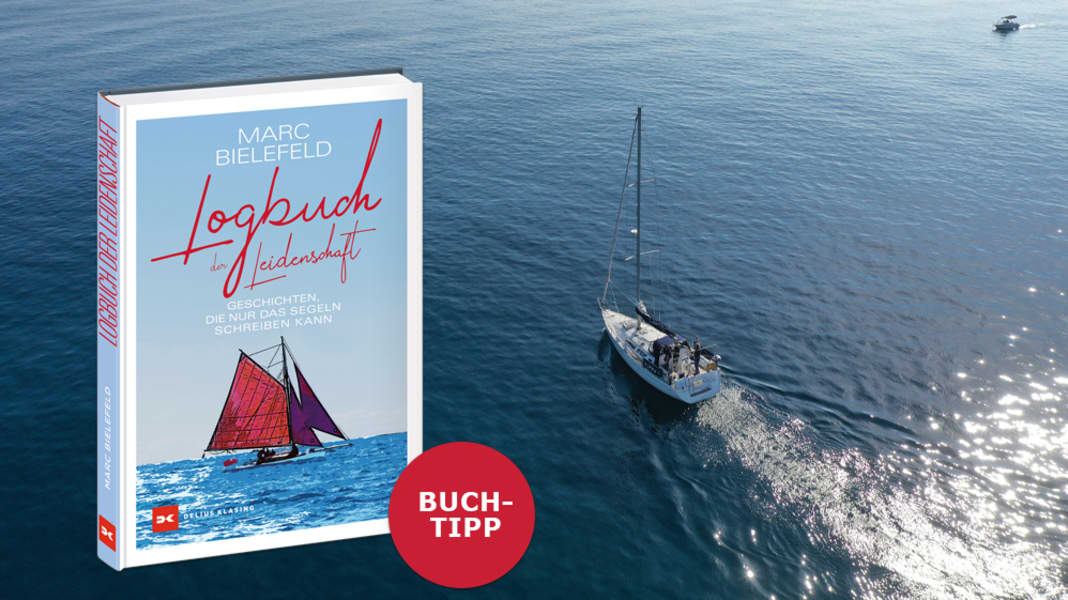Book tip: "Logbook of passion" - 15 times love for sailing

Marc Bielefeld is convinced that anything can be achieved with the right drive. The strongest human driving force is passion - the free and invaluable talent to burn for a cause. In his new book, he has collected 15 impressive stories of people who have mastered the greatest challenges, realised their dreams and experienced fascinating adventures with this very passion. Personalities from different eras and with different biographies: from Suzanne van der Veeken, who hitchsails around the world, to Theodor Fontane, who sought inspiration on a sailing trip almost 150 years ago, to Matthes Sierk, who broke out of his predetermined career path in his mid-20s, bought a yacht and learnt to sail.
As different as the stories and the people behind them are, they all have one thing in common: their heart beats for sailing, for wind and sea. Marc Bielefeld, himself a passionate sailor, brings together the various portraits and reports in this book to create a tribute to sailing. His writing style is no less passionate and captivating than the stories he brings to life.
A free spirit alone on the ocean: Bernard Moitessier
We would like to present one of them to you here. It dates back to 1968 and is that of the Frenchman Bernard Moitessier, who had already become a well-known tall ship sailor at the time with his voyage around Cape Horn. At the time, he lived on his boat "Joshua", a fourteen metre long red ketch, and was a free spirit who felt more comfortable in oceanic solitude than among people.
In February 1968, the London "Sunday Times" tried to win Moitessier over for a project that he initially vehemently rejected. At the time, the newspaper was planning to organise the world's first solo non-stop circumnavigation as a regatta and wanted to recruit the Frenchman as a participant. The first to return would receive a trophy; the fastest would receive a £5,000 prize. He is deeply reluctant to turn a round-the-world voyage into such a sensationalised media event and, in his eyes, does not do justice to the significance of such a special journey. For him, it is as if the public were intruding into his sacred refuge of sea and solitude.
A voyage of this magnitude, without GPS and without modern nautical charts, was a milestone in sporting history at the time and also harboured a deadly risk for the participants. Nine men finally took up the challenge and set off on the open-ended journey - among them, contrary to expectations, Bernard Moitessier.
You might think he has changed his mind, but the Frenchman is sailing the regatta according to his own standards, against all norms. While some of the other sailors occasionally communicate their positions by radio, Moitessier rarely gives any sign of life and remains alone with himself, the sea and the wind. He has nothing but contempt for the "Sunday Times" and addresses his few messages exclusively to his publisher. Nobody knows his intentions.

The conditions at sea are tough: storms, illness and damage to the ships force many to give up after just a third of the route. At this point, we don't want to give away the full details of the strange and dramatic course of the race. But this much can be said: Moitessier and his "Joshua" are in the lead and victory seems certain when he suddenly turns and changes course.
On a route far removed from all victories, on a journey beyond all trophies and conventions he sailed on and on until he docked in the South Seas after an incredible 303 days at sea and 37,000 nautical miles. He sailed around the world more than one and a half times during this time, forgoing fame and public attention. He made this journey just for himself, thereby rejecting the commercialisation of sailing. For Moitessier, sailing was pure passion - and he wanted it to stay that way.
You can find even more exciting stories about the attraction of the sea and the passion of sailing in the Logbook of passion read: Click here for the book

